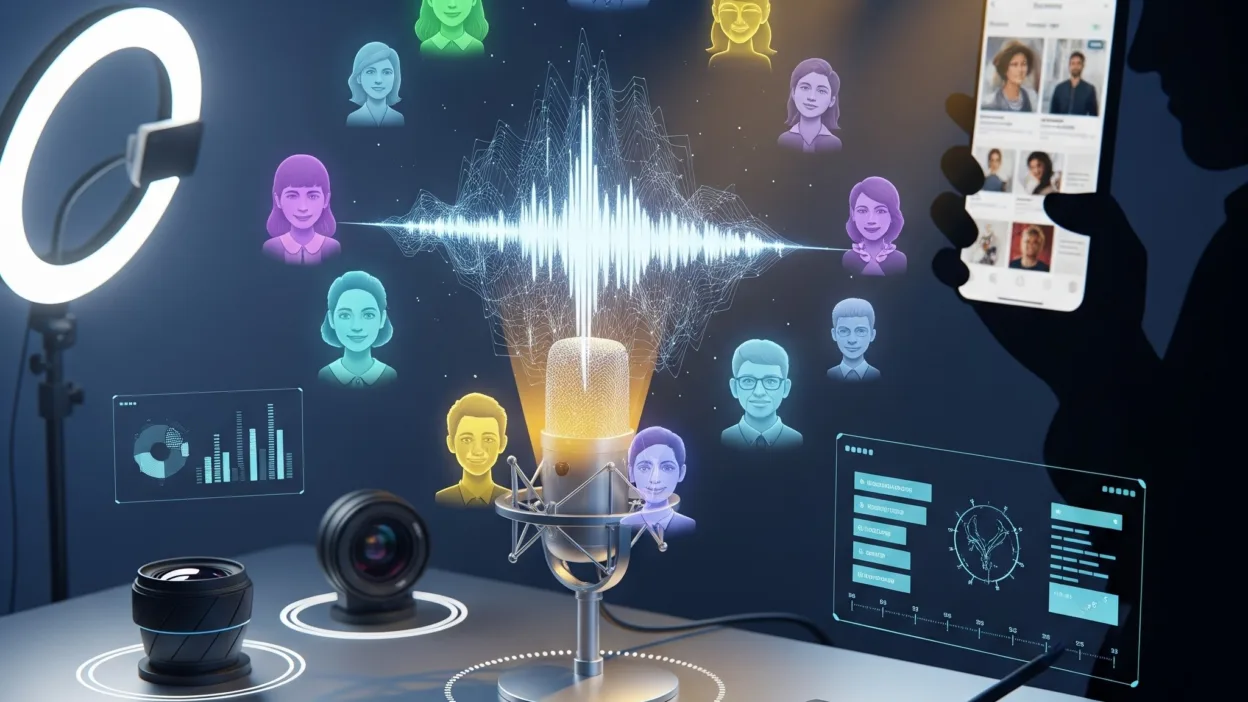The world of content creation is evolving rapidly and one of the newest trends stirring both excitement and ethical debate is AI voice cloning. From creators duplicating their own voice to scale content production, to brands collaborating with influencers to create synthetic voiceovers, AI-generated voices are no longer sci-fi. They’re a reality and they’re reshaping the future of how content is made, distributed, and monetized.
What Is AI Voice Cloning?
AI voice cloning refers to the use of machine learning to replicate a person’s voice with a high level of accuracy. Tools like ElevenLabs, Descript’s Overdub, Murf.ai, and Play.ht are making it easier for creators to train models on their voice and generate completely new audio clips that sound just like them.
This opens up a world of possibilities: automating podcast episodes, localizing video content in different languages using the same voice, or scaling TikTok and YouTube Shorts by narrating scripts with cloned voices instead of recording audio manually every time.
Why It’s Trending Right Now
Over the past year, AI voice cloning tools have improved significantly. Voices sound more human, with emotional nuance, correct pacing, and minimal robotic glitches. More importantly, mainstream creators are starting to talk about it and use it.
As generative AI continues to infiltrate creative industries, creators are finding ways to maintain quality while increasing output. AI voice cloning is the perfect solution for scaling up content without compromising the personal touch of your voice.
Popular Use Cases for Creators
- YouTube Automation: Creators producing faceless YouTube videos can now clone their voice to keep branding consistent while saving time.
- Podcasting: Missed a line? Need to change a section? Use your voice clone to fill in the blanks without re-recording the full episode.
- TikTok/Shorts/Instagram Reels: Narrate multiple short-form videos quickly using AI, especially if your content follows a script or format.
- Multilingual Expansion: Translate your content into other languages and keep your original voice tone and identity.
- Virtual Assistants & Courses: Use your cloned voice for coaching modules, sales funnels, or tutorials.
Impact on Influencer Marketing
Influencers with signature voices are exploring new monetization opportunities through licensing. Just like brands license image rights or UGC, voice clones may be used in ads, product explainers, or global campaigns. Think of it as voice-based brand collaboration, done entirely with synthetic speech.
SEO and Content Marketing Implications
For digital marketers and SEO professionals, AI voice cloning enables:
- Faster creation of audio versions of blog posts or newsletters for better accessibility.
- Localized voice search content.
- Voice-over content for multiple platforms from a single recording.
Pairing AI voice with AI-generated scripts or blog-to-voice tools allows creators to turn articles into YouTube videos or podcast episodes, boosting reach without burning out.
Ethical and Legal Considerations
This trend isn’t without its risks. Consent, deepfake abuse, and impersonation are major concerns. Platforms are still catching up with policies, and many voice cloning tools now require voice training to be ethically sourced or approved.
Creators should:
- Clearly disclose when voice cloning is used.
- Protect their own voice data from being used without permission.
- License use of their cloned voice if collaborating with brands.
How to Get Started With Voice Cloning
If you’re a content creator curious about trying it:
- Start with tools like ElevenLabs.io or Descript Overdub.
- Record a high-quality voice dataset (usually 30–60 minutes).
- Train your voice clone.
- Use the dashboard or API to generate speech from scripts.
- Test across platforms like YouTube, TikTok, podcasts to see what works best.
Future Predictions
Voice cloning will become a staple in creator toolkits, much like Canva or ChatGPT. As quality improves and trust systems are built around ethical usage, we’ll see more creators building entire AI-assisted content brands that sound human because they are, just amplified.
Final Thoughts
AI voice cloning is more than a gimmick. It’s a powerful tool for scaling, automating, and personalizing content in ways never imagined. If you’re building a brand or creating digital products, this tech could become one of your most valuable assets, as long as it’s used wisely.



